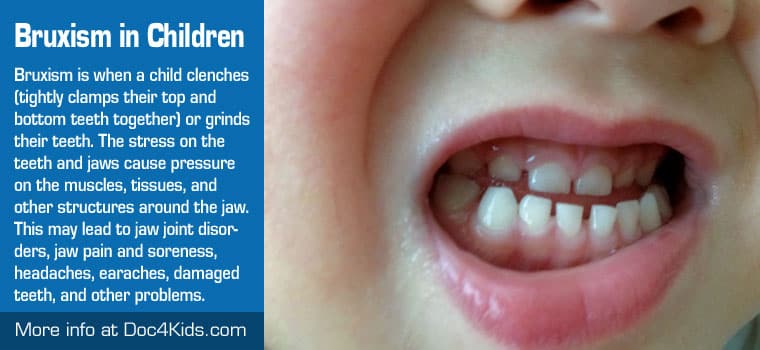Bruxism is when a child clenches (tightly clamps their top and bottom teeth together) or grinds their teeth. The stress on the teeth and jaws cause pressure on the muscles, tissues, and other structures around the jaw. This may lead to jaw joint disorders, jaw pain and soreness, headaches, earaches, damaged teeth, and other problems. These symptoms are often collectively referred to as “TMJ” or tempero-mandibular joint. Many children may also grind their teeth. Grinding is when they slide their teeth over each other, generally in a sideways, back-and-forth movement. This action may wear down the teeth and be noisy. Like clenching, grinding can lead to jaw pain and other problems.
Some kids probably clench/grind and never feel symptoms. Whether or not bruxism causes pain and other problems may be a complicated mix of factors. Stress, how long and tightly the child clenches and grinds, whether the teeth are misaligned, diet, sleeping habits, and other factors all contribute to this syndrome. Each child is probably different.
Symptoms
- Teeth grinding, which may be loud enough to annoy sleeping partners
- Sore or painful jaw
- Headache
- Earache Partly because the structures of the tempero-mandibular joint are very close to the ear canal, and partly because of referred muscle pain (pain that is perceived in a location different from its actual source).
- Anxiety and stress
Treatment
The goals of treatment are to reduce pain, prevent permanent damage to the teeth, and reduce clenching behaviors as much as possible. To help relieve pain, there may self-care steps you can take at home. For example:
- Relax your facial and jaw muscles throughout the day. The goal is to make facial relaxation a habit.
- Massage the muscles of the neck, shoulders, and face. Search carefully for small, painful nodules called trigger points that can refer pain throughout the head and face An excellent resource is The Trigger Point Therapy Workbook by Claire Davies.
- Learn physical therapy and stretching exercises to help the restore a normal balance to the action of the muscles and joint on each side of the head. An excellent resource is Taking Control of TMJ by Robert Uppgaard.
- Apply ice or wet heat to sore jaw muscles. Either can have a beneficial effect.
- Avoid eating hard foods like nuts, candies, and steak.
- Drink plenty of water every day.
- Reduce stress and learn relaxation techniques.
- Get plenty of sleep.
To prevent damage to the teeth, mouth guards or appliances (splints) have been used since the 1930’s to treat teeth grinding, clenching, and TMJ disorders. A splint may help protect the teeth from the pressure of clenching. It may also actually help reduce clenching behaviors, but some people find that it makes their clenching worse. In others, the symptoms go away as long as they use the splint, but pain returns when they stop or the splint loses its effectiveness over time. There are many different types of splints. Some fit over the top of the teeth, some on the bottom. They may be designed to keep your jaw in a more relaxed position or provide some other function. If one type doesn’t work, another may. For example, one splint fits over just the front teeth. The idea is to keep all of your back teeth (molars) completely separated, under the theory that most clenching is done on these back teeth.
As a next phase after splint therapy, orthodontic adjustment of the bite pattern may be beneficial for some people. Surgery should be considered a last resort. Finally, there have been numerous approaches to try to help children unlearn their clenching behaviors. These are more successful for daytime clenching, since nighttime clenching is cannot be consciously stopped. In some people, just relaxing and modifying daytime behavior is enough to reduce nighttime bruxism. Methods to directly modify nighttime clenching have not been well studied. They include various biofeedback devices, self-hypnosis, and other alternative therapies.
Expectations (prognosis)
Bruxism is not a dangerous disorder. However, it can cause permanent damage to the teeth and uncomfortable jaw pain, headaches, or ear pain. Ask us for a list of local pedodontists (pediatric dentists) if your child is having trouble eating or opening their mouth. Dentists who specialize in evaluating and treating TMJ disorders will typically perform x-ray exams and prescribe a mouth guard. The vast majority of TMJ experts now consider surgery a last resort.
Copyright A.D.A.M.
Bruxism rev.: 11/12/09

